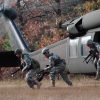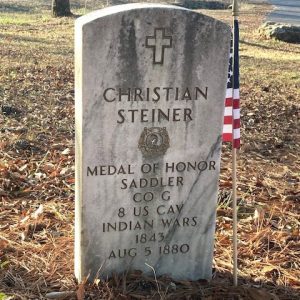calsfoundation@cals.org
Christian Steiner (1843–1880)
Christian Steiner was a soldier who was awarded the Medal of Honor for his gallantry during an 1869 battle against Apache Indians in the Chiricahua Mountains of Arizona. He died in Hot Springs (Garland County) and is buried there.
Christian Steiner was born in Wurttemberg, Germany, in 1843. By 1860, he had immigrated to the United States and was living with saloon keeper Philip Steiner, then twenty-seven, who was presumably his brother, and his brother’s wife, Louisa (twenty-one), in the Third Ward of St. Louis, Missouri. Seventeen-year-old Christian Steiner’s occupation was listed as saddler in the 1860 census.
As the Civil War broke out, Steiner joined many of St. Louis’s citizens of German descent in enlisting in the Union army. He enrolled as a drummer in Company B, Second Missouri Infantry Regiment on July 6, 1861, and was mustered in with the regiment at the St. Louis Arsenal on September 10, 1861. During its service, the Second Missouri would see battle at Pea Ridge (Benton County) in Arkansas; Perryville, Kentucky; Stone’s River and Missionary Ridge in Tennessee; and Chickamauga and Dalton, Georgia. Steiner mustered out with his comrades at St. Louis on September 27, 1864.
Military life must have appealed to the young immigrant, as he enlisted as a saddler in Company G of the Eighth U.S. Cavalry at St. Louis on May 12, 1868, for a five-year term.
Steiner was part of a sixty-one-man contingent of Company G under the command of Captain Reuben Frank Bernard pursuing Cochise’s band of Apache warriors in the Chiricahua Mountains in late October 1869. As a six-man patrol ascended Chiricahua Pass, it was ambushed by as many as 200 Apaches. Bernard brought up the rest of his command and established a firing line even as two soldiers were killed and another wounded. After several attempts to outmaneuver the Indians were repulsed, Bernard realized that he was outgunned and decided to withdraw. An attempt to retrieve dead members of his command around sunset was rebuffed, with an officer being shot in the face, and the soldiers withdrew, taking their wounded with them. Bernard claimed that the action cost Cochise eighteen dead warriors and several wounded.
Thirty-one of the enlisted men in Company G were awarded the Medal of Honor for “gallantry in action” in the October 20, 1869, fight at Chiricahua Pass, including Steiner.
Steiner was discharged from service at Fort Selden, New Mexico, on May 12, 1873, at the expiration of his enlistment. He reenlisted at Alleghany Arsenal on August 1, 1874. After serving as an ordnance sergeant, Steiner was discharged at the arsenal at the end of his term on July 31, 1879.
Steiner, then thirty-six, reenlisted for a final time on August 19, 1879, at Buffalo, New York, this time in Company A, Fifth U.S. Cavalry. The years had been hard on the veteran soldier, and by 1880 he was in the military hospital in Hot Springs suffering from chronic rheumatism. He died of congestion of the lungs at age thirty-seven on August 5, 1880, his death noted in the Daily Arkansas Democrat with a single sentence: “Christian Steiner, of the Fifth Cavalry, U.S.A., died last week at Hot Springs.” Steiner is buried at Hollywood Cemetery in Hot Springs.
For additional information:
“Arkansas State News.” Daily Arkansas Democrat, August 9, 1880, p. 4.
O’Neal, Bill. Fighting Men of the Indian Wars: A Biographical Encyclopedia of the Mountain Men, Soldiers, Cowboys, and Pioneers Who Took up Arms during America’s Westward Expansion. Stillwater, OK: Barbed Wire Press, 1991.
Sweeney, Edwin R. Cochise: Chiricahua Apache Chief. Norman: University of Oklahoma Press, 1991.
Mark K. Christ
Little Rock, Arkansas


 Steiner Grave
Steiner Grave 



Comments
No comments on this entry yet.